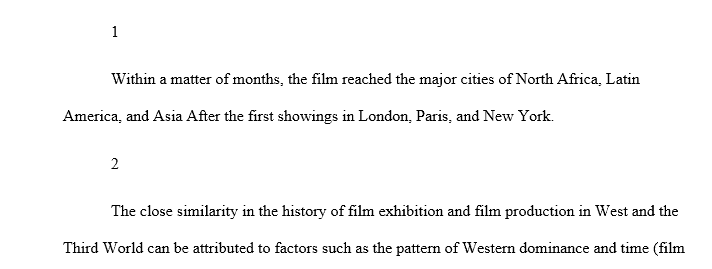State 5 factors that have defined Third World film making over the years
Based on material in the reading by Roy Armes from page 1-49
Questions
How long did it take for film to reach the major cities of Asia, Latin America and North Africa after the first film showings in Paris, London and New York?
Why is the history of film production and film exhibition in the West almost the same as in the Third World?
With which conference of nations, held in which year, is the term “Third World” usually traced back to?
What problems of categorization do we encounter when we use the term “Third World” to identify films produced in places such as Mali, Brazil, India or Ouagadougou?
State 5 factors that have defined Third World film making over the years.
By which year did European nations reach the height of their power?
What percentage of the world did European powers dominate at the height of their power?
Under what historical circumstances did “Third World” as a notion come into being?
In which decade did the notion of “Third World” gain momentum and currency?
According to Pierre Jalee, what do the countries and economies of Africa have in comparison with those of the countries and economies of the First World?
According to Roy Armes in Third World Film Making and the West, how is the legitimacy of the colonizer ensured in the colony that the colonizer has taken over?
State 4 factors on which the identity of the colonized depends.
After undermining the languages of the colonized through the education system, what language does the colonizer impose on the colonized?
Besides commerce and law, name another area on which the language of the colonizer is imposed?
According to Albert Memmi as quoted on page 11 in Roy Armes’ book Third World Film Making and the West that we are reading in this class, why is the language of the colonized people important to them?
According to Renato Constantino as quoted by Roy Armes on page 12 of Third World Film Making and the West, what does education administered by colonial powers do to the colonized school children perception of their national history?
According to Renato Constantino as quoted by Roy Armes on page 12 of Third World Film Making and the West, how did colonial education affect Filipinos in terms of how they perceived themselves in relation to the colonizers?
According to Renato Constantino as quoted by Roy Armes on page 12 of Third World Film Making and the West, what is the term that describes the feelings that overwhelm colonized people who feel that they are less compared to the colonizer?
State two factors which, according to Roy Armes in Third World Film Making and the West, are responsible for the persistence of problems of language, culture and identity manufactured by colonialism.
What processes did taxation under colonialism trigger in the colonized countries?
According to Roy Armes, “the persistence in post-independence societies of the problems of language, culture and identity produced by colonialism derives from factors relating to both economic relations and the nature of the colonial state.” State 2 aspects of the colonial state apparatus established during colonial rule that distinguish it from all other forms of social organization and make it central in the perpetuation of colonial of colonialist ideals.
List the 3 ways in which tribal chiefs in the Third World were cut off from the mass of the population and made to be dependent on the colonial state in the Third World.
What did the colonial French policy of Assimilation involve or entail in French colonies?
What did Leopold Senghor and the leaders of other nationalist movements in West Africa do when they were asked to choose between total independence and continued association with France?
Answer preview to state 5 factors that have defined Third World film making over the years
APA
985 words



